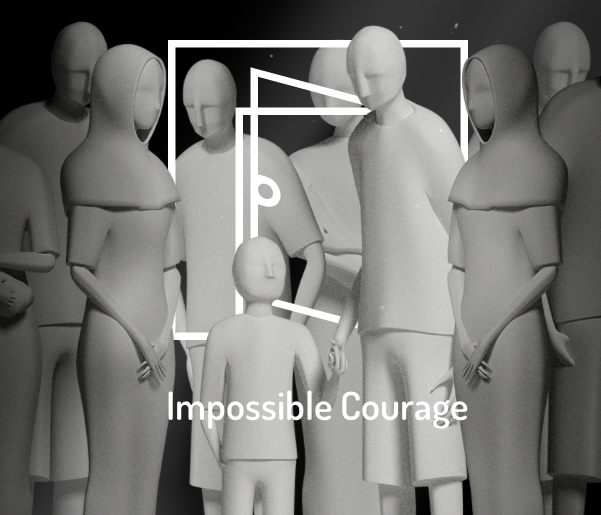Art can be a powerful way to bridge many of the gaps that exist in our world – bringing people together across perceived divides among cultures, genders, ages, and many more categories. These days, the same could certainly be said for technology, which connects us in astonishingly speedy ways, rendering time zones and country borders far less significant than they once were. For Atthar Mirza, a 2017 UVA graduate of the Architecture School and Founder of Exemplum Studios – a production house focused on utilizing cutting-edge technology to tell stories – technology is simply the best mode with which to create change. While he’s always been drawn to 3D modeling, animation, and their ilk, he harbored some concerns that technology’s unstoppable march forward was actually causing us to become more isolated from each other and from the world around us. A thoughtful person with a self-avowed love of talking to people, Mirza figured that these two aspects of his personality – an interest in the humanities and a skill for technology – were bound to always remain distinct and separate. However, as someone skilled at being the bridge between two seemingly disparate groups (“I speak English with you, but I speak Urdu at home,” he tells me, just one example to illustrate the middle ground he’s “always walking” between his parents’ culture and the American culture with which he grew up), it’s no surprise that he’d ultimately find an unexpected, but graceful, way to merge the two.
A project-based, hands-on class Mirza took at UVA in the fall of 2016 served as the initial catalyst. The class, taught by Professor Elgin Cleckley, asked its participants to spend their semester solving problems around the refugee crisis. While many took a logistical tack, Mirza says, “I thought the problem most relevant to me was that I was getting really frustrated with people’s views about folks coming into the country.” So, he decided to tackle the concept of “immigrant perception,” and, as a complement to the more operational ideas of his classmates, he wanted to focus on “after they’ve gotten to a new country, how do you make them feel welcome?”
“The essence of Impossible Courage [Mirza’s first project, which originated in this class] is that there’s a conversation that needs to happen around refugees, but if it comes from a place of fear, we’re not going to make good decisions.” So Mirza set about building an experience that would help those who encountered it “shift from a place of fear to a place of empathy.” The idea grew larger and more ambitious in scale as time went by, eventually turning into his thesis for the year, with professors Mona Kasra, Tim Cunningham and Kirsten Gelsdorf, in addition to Cleckley, serving as advisors on the project. What started as a first-draft Google Cardboard iteration gained momentum, thanks in part to being awarded some funding from a few UVA-related sources, and by the time Mirza graduated from the university this past May, he had developed a full HTC Vive prototype that allows users to fully immerse themselves in the virtual world he’s created.
“Exemplum is a story of meaning; that’s what it means,” Mirza shares. Atthar believes wholeheartedly that meaningful stories can be a key to unlocking greater social tolerance, understanding, and empathy, and that they can, ideally, help to spur positive action on the part of those they touch. For Mirza, this aspect is just as paramount to Exemplum’s mission – part of his thesis involved conducting a behavioral study to sense people’s changes in perception after completing the VR experience – and it comes from a very personal place. Members of his family were refugees from Kuwait right before the start of the Gulf War. After moving to the U.S., Atthar's parents started a family among a diverse community in Seattle. In Impossible Courage (and subsequent projects), Mirza hopes to help open others’ eyes to the many benefits of cultivating a diverse perspective from a young age, just as he was fortunate to do.
While he clearly possesses multitudes in artistic sensibility and technical know-how, he admits he currently lacks some of the business chops he’ll need to turn this passion project into a sustainable company. He credits the i.Lab with helping him think through those aspects – since he started in this summer’s cohort, his mind has been buzzing with new considerations, from functioning as a VR contractor to making custom exhibits for museums and nonprofits. Luckily, he’s got a dynamic team of programmers – Omar El-Sheikh, Connor Anderson, and Collin Hansen – as well as a researcher – Claire Poumerol – at his side to help execute on the promising path ahead.
In a recent TEDx talk here at the University of Virginia, Mirza reflected on the potential of a VR-powered world: “here was a technology that had the potential to isolate us in our own digital worlds – could keep us plugged, keep us oblivious to our surroundings…a lot like Disney Pixar’s WALL-E…[but] I actually now believe it has the potential to connect people in a way that just wasn’t possible before.”

